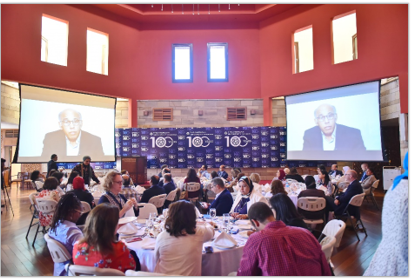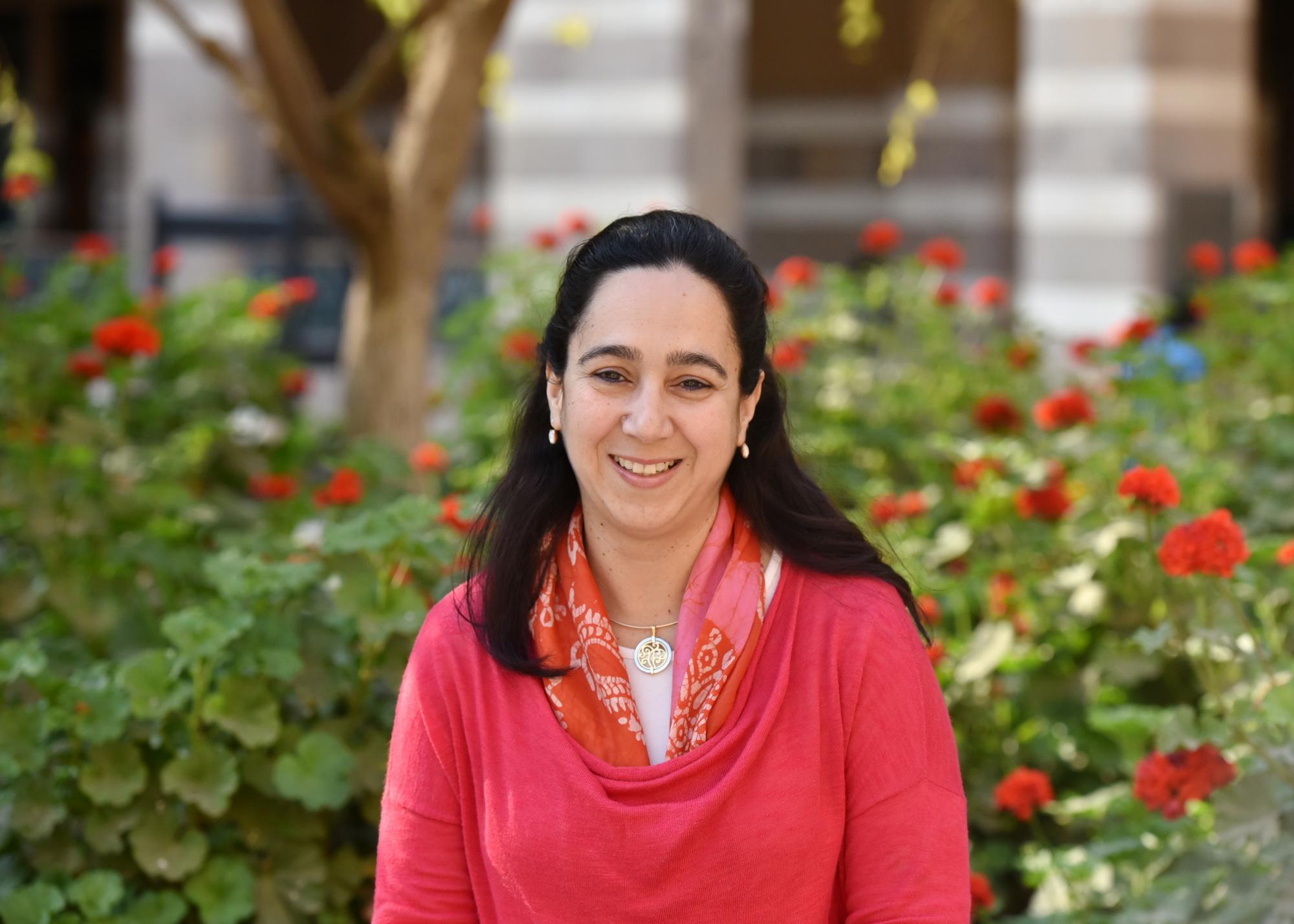CLT hosted a Campus Conversation on Digital Education on Wednesday, October 9th, held in Moataz Al Alfi hall. The event included over 60 AUC faculty, chairs, deans and staff, some of whom had previous experience with digital education at AUC as pioneers or enablers. Campus Conversations aim to bring diverse stakeholders to the same learning space to share ideas and communicate directly. These campus conversations enable us at CLT to better understand our faculty and learning landscape, build insights and connect these learnings to action.
Milestones in AUC’s Digital Education Journey So Far
The two-hour event started by Aziza Ellozy, Associate Provost for Transformative Learning and Teaching and founding director of CLT, who highlighted the place of digital education in AUC’s strategic plan and invited the audience to explore the resources offered by CLT’s newly established Digital Education Unit. Later, Hoda Mostafa, CLT Director, shared the importance of supporting faculty and departments along a journey towards digital education that may be most beneficial for them and their stakeholders. With the establishment of this new support unit, AUC is now empowered with further resources and capacity to support programs in moving towards more blended and online learning.
This digital learning initiative currently helps fulfill AUC’s strategic plan in terms of improving the quality of education and integrating innovation in teaching.
AUC started integrating digital strategies and components in its offerings since 2002 when we started using WebCT, the first Learning Management System (LMS) AUC used. This later merged with Blackboard, which AUC now uses in for-credit courses, and AUC also uses Moodle for some credit and non-credit offerings.
CLT has supported and enabled the pathway to digital education from the beginning, by supporting the design of online and blended learning via one-on-one course design projects and consultations and small-group professional development such as the Blended Learning 6-week certificate, developing instructional multimedia, and offering Student Technology Assistants (STAs) services to help faculty one-on-one learn the LMS and other technology tools, and offering in-class training to students on new tools. CLT has also always been a key player in assessing the success and impact of AUC’s digital learning endeavors, and has always been involved in setting AUC’s digital education strategies and policies. CLT’s new digital education unit has dedicated resources focused on enhancing AUC’s digital offerings in line with the strategic plan.
Since the AY 2017-2018, CLT has supported the design and development of over 20 courses. Launched courses included a 5 course blended certificate in Foundations of Business Administration (SCE) and the region’s first fully online Digital Media Diploma taught in Arabic (Adham Center-GAPP). The Arabic Language Instruction Unit (ALI – ALA) launched their first blended learning courses for undergraduate students in Fall 2019.
Pioneers in AUC’s Digital Education
There were several participants in the audience across the various schools who had been pioneers of digital education, such as those who taught the first AUC blended courses, MOOCs, and those who developed AUC’s first fully online diploma, and others who are working on/worked on blended programs that are currently in the pipeline.
A brief video of AUC faculty commenting on their experience with digital education was played for the audience. To watch the video click here
In the video, faculty spoke about the importance of reaching new audiences who are unable to come to AUC. For example, Hussein Amin, Director of the Adham Center talked about how “A lot of people in Egypt, would like to know about digital media, and they don’t have the opportunity to travel from the different governorates to come to Cairo, to come to the American University to this traditional setting, classroom setting”. Thus, his center developed the first fully-online Digital Media Diploma in Arabic, which has an audience of Arabic-speaking students from all over the world. This is AUC’s first independently-developed fully online diploma, and was launched in 2019.
Raghda Essawi (APLN) one of AUC’s pioneers in designing and developing blended learning courses, said:
“You don’t need to attract your students to AUC, but you can go to your students wherever they are. It makes sense. It made perfect sense to me.”
Faculty spoke about how digital learning can enhance the quality of learning.
Khaled Tarabieh (ARCH), one of the faculty involved in AUC’s ProGreen online diploma co-developed with American University in Beirut and Lebanese American University, said how online learning is “actually making learning more interesting and easier”.
Naila Hamdy (JRMC) who has taught a blended course, said that “This gives [students] the opportunity to do their own learning. I don’t spoon feed them”.
Andreas Kakarougkas, BIOL, one of the faculty members who worked on the pilot project of integrating MITx material at AUC, mentioned several benefits of digitally enhanced learning, including:
- “I feel it’s made me a more active educator”.
- “I like the fact that students are able to go back and access the material any time”
- “It frees up more time in class”
Raghda Essawi, a teacher educator, talked about how blended learning enhances interactivity:
“Collaboration has increased 100%. The quiet student, the student who doesn’t do the reading and sits back and watches others do the discussion while they sit back smiling, the shy students, all of these students are forced to participate actively in class, and they are not used to that.” She also spoke about how digital formats enable new forms of learning that are necessary nowadays. Raghda spoke of how her students are teachers themselves:
“If my students are taking courses in a blended form, they will be able to teach their own students in a blended form,” increasing the impact beyond the walls of AUC.
Digital Learning Dividends
Vijay Kumar, Associate Dean of Open Learning and Executive Director of the Jameel World Education Lab (J-WEL) at MIT sent a video presentation for the AUC community. His presentation was entitled “Digital Learning Dividends” and highlighted the “value proposition” for digital learning. He highlighted the diversity of ways of offering learning digitally, and across a variety of disciplines for different purposes. Sometimes it enhances understanding, sometimes it enables opportunities for practical experiences to remote audiences.
He talked about how quality was central to all of MIT’s educational practices, and how MIT values active learning and ensures all of its digital offerings maintain fidelity to MIT’s educational value proposition of high quality education with high degrees of interaction and hands-on learning experiences. At this point, CLT director, Hoda Mostafa reminded the audience to think of what AUC’s value proposition was, so that we ensure we maintain it in all of our digital endeavors.
Vijay also gave several examples of digital education in practice at MIT across a variety of disciplines, and showed research showing improved student learning with the use of digital education. Vijay showed how interactivity and quality of learning can be maintained and even enhanced with digital means. To watch the full video of Vijay’s talk, click here.
Exploring Opportunities
The second half of this event involved participants working with CLT on their tables (divided by school) to explore potential opportunities for digital education in their own context, and articulating potential barriers and challenges, and ways to overcome them. Opportunities for reaching audiences outside of Cairo and outside of Egypt, as well as opportunities to extend some of AUC’s unique offerings to the world, were explored. Participants also discussed amongst themselves which programs may benefit from becoming online or blended, and the kinds of support they would need from CLT and other entities at AUC to enable them to overcome expected challenges.
Commitment Cards
At the end of the day, participants wrote commitment cards and submitted them to CLT. Participants committed to either follow up with their own departments to continue exploring or advocating for digital education where it might be beneficial, or they committed to follow up with CLT to consult on potential future development of online or blended programs, or professional development for their faculty.
In this community campus conversation, stakeholders hopefully felt inspired to explore opportunities with CLT support and left with a better understanding of their individual or programmatic needs. This event aimed at highlighting to the community the transformative power of integrating digital education, whether online, blended or web-enhanced learning into their programs.
To express interest or arrange a consultation please fill out the Request a Consultation form on CLT website: https://www.aucegypt.edu/faculty/center-learning-and-teaching


